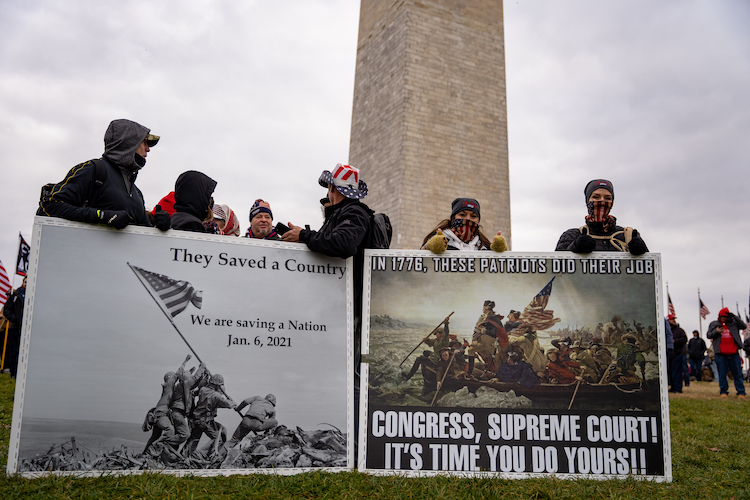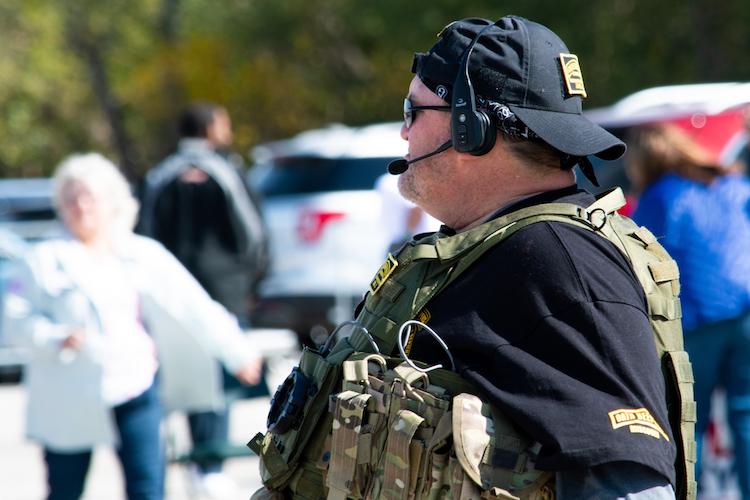Let's Talk Human Rights

Veterans and the January 6th Insurrection Attempt
By Benjamin Schrader
Two days after the violent storming of the US Capitol by Donald Trump’s supporters on January 6th, Veterans Affairs (VA) Secretary Robert Wilkie tweeted:
Our #Veterans fought to defend the freedoms that were attacked this week. The assault on the Capitol is an affront to all who have worn the uniform.
As more details about this assault emerge, it is clear that veterans were present in many different capacities at the Capitol that day. There were 91 veterans among the members of Congress forced to take shelter as rioters breached the building. Air Force veteran Ashli Babbitt was shot and killed by a security officer as she tried to climb through a barricaded doorway, and retired Air Force Lieutenant Colonel Larry Rendall Brock, Jr. was seen carrying plastic restraints onto the Senate floor. Capitol Police Officer Brian D. Sicknick, an Air National Guardsman who had served in Iraq and Afghanistan before becoming an anti-war advocate, was killed in the line of duty by protestors, while his fellow CPD officer and Iraq war veteran Eugene Goodman has been hailed for leading rioters away from the Senate chamber.
Judging by photographs and videos of the rioters, one might assume many more of them were veterans, given the large quantities of military gear on display. Indeed, NPR recently reported that 1 in 5 of the rioters charged with crimes so far have military experience. But combat-style clothing and equipment have become standard accessories for conservative activists, from the boogaloo movement to anti-Covid lockdown protest groups. Flags and insignia carried by the rioters also blur the line between veterans and civilian militias, including Gadsden flags, “Come and Take It” Texas militia flags, Oath Keeper hats, and a wide array of military unit patches.
 A member of the Oath Keepers right-wing militia group wearing a tactical vest (Shutterstock/Ryanzo W. Perez)
A member of the Oath Keepers right-wing militia group wearing a tactical vest (Shutterstock/Ryanzo W. Perez)
While veterans tend to be more politically conservative than the public at large, this hardly explains veterans’ involvement in an attempted overthrow of the US government. While the VA Secretary is right to call the attack an “affront to all who have worn the uniform”, it is critical to explore how some veterans could see participation in the riot as an extension of their duty rather than a dereliction of it.
Part of this can be explained by what I call the “Soldier’s Contract.” A long tradition of research in political science has tried to define the relationship between the state and the people, and identify how they mutually support and limit each other. This relationship is generally described as “The Social Contract.” But soldiers and veterans have a different relationship to the state than ordinary citizens. While citizens pledge allegiance to the state in exchange for protection of their rights and liberties, soldiers are the sword that protects both the state and citizens.
Soldiers swear an oath to defend the Constitution against enemies foreign and domestic. They also swear an oath to follow the orders of the President. Soldiers are taught that it is their duty to disobey any unlawful orders they receive while in service. But many veterans, myself included, believe that their oath of service extends beyond their time in the military. They seek to uphold the ideals embodied in the Soldier’s Contract in their everyday lives.
The political leanings of veterans can lead to significant differences in how they interpret their “Soldiers Contract” and their oath of service. Conspiracy theories like QAnon, which exploit the language of patriotism and duty and ask that followers pledge oaths of loyalty to fellow believers, are arguably especially attractive to veterans. The fact that General Michael Flynn has helped promote the QAnon theory increases its appeal. Other right-wing groups such as the Oath Keepers, whose leader was recently indicted on Federal conspiracy charges for his role in the riot, actively recruit former military veterans. While a veteran like Brian Sicknick may have viewed it as his duty to protect the voting process and defend those in the Capitol, a veteran who is a QAnon follower could believe that following the orders, or even the informal directives, of the President is most important. This explains veteran involvement on all sides of the violence that took place at the US Capitol.
There should be some concern over the training that soldiers receive and the lessons learned while deployed in places like Iraq and Afghanistan being brought home and used against the US populace. This is an effect known as Foucault’s Boomerang. It can already be identified in policing practices as US police forces become more militarized. And it can also be seen in the increasing militarization of conservative activist groups, as illustrated by the “Boogaloo movement,” with the example of the Airforce Staff Sgt Steven Carrillo shooting of two police officers in Santa Cruz. This is not just localized in conservative movements as there appears to be an increase in militarization within liberal activism, evidenced by the rise in gun sales to liberal buyers, and the increasing number of organizations with military experience to help train gun safety to new gun owners, including the John Brown Gun Club, the Liberal Gun Club, and others.
As we transition to new national leadership, what social change will the next few years bring for the American people? Will there be an escalation in political violence in the US? What role will veterans play in all of this? Regardless of what happens, veterans will have an influential role. The past twenty years of war that has been central to the experience of US soldiers and recent veterans give them the tools to make the future a more dangerous one. At the same time, it should also provide them with the insight to understand the horrors of war and the commitment to ensure that conflict does not happen at home. We will see.
Dr. Benjamin Schrader is a Political Scientist who conducted research on veteran activism for the Vietnam Legacies Project at the HRC. His work is focused on veterans' relationship to the state and civilian populations in what he calls the Soldiers Contract. He is currently an instructor for the University of California, Irvine, Veteran Studies Program.
